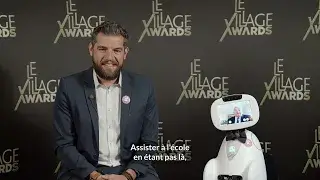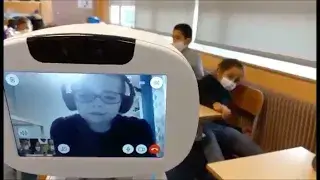Buddy & The national Education MINISTRY
TED-I Program
Never without my class: 1750 Buddy robots in schools
Continuing your education, even while hospitalized, and keeping in touch with your class is now possible thanks to Buddy, the avatar for sick children.From his hospital room, Buddy allows the sick student to interact with his class by emitting signs of interactivity (moods, messages, requests to speak, etc.), to move around the classroom or even follow his friends during recess, in the canteen or on school trips.Buddy is not only a simple tele-education device for sick children. The cute little robot on wheels with its big eyes allows to create social link through its emotional companion aspect, to be accepted as a real class friend. Indeed, the empathetic side of Buddy constitutes a more convincing incarnation than a classic videoconferencing solution, and allows a stronger physical presence of the homebound student. When we know that socialization promotes children’s chances of recovery, Buddy therefore appears like a real superhero. Integration is not only educational but also social.Mainly intended for primary school students aged 5 to 11, Buddy robots allow students to be “tele-present” remotely.
“Not only the students participate in all teaching activities, but they can interact with their environment. Tele-presence robots allow them to move, exchange and register their presence within establishments, which they continue to occupy “physically” "
Jean-Michel Blanquer, former National Education Minister
TED-i : A unique educational inclusion project in the world
 The Ministry of National Education launched this national TED-i program, providing for an initial allocation of 4,000 robotic telepresence systems, intended to be allocated to children and young people, from kindergarten to university, who are prevented by the illness, hospitalized or kept in chronic home care.
Each year, nearly 12,000 students per year are hospitalized for long periods. For these students, the continuity of their school career must be ensured whatever their situation if their hospitalization conditions allow it.
Educational support at home at the hospital or at school (APADHE) is put in place, aiming to maintain educational continuity. In addition and in order to ensure social continuity, namely the human connection with the student’s teachers and classmates, the Ministry of National Education provides tele-presence robots to educational establishments ranging from the start of the primary cycle to university for young children, young adolescents and adults who are seriously ill and for long periods of time, to allow them to continue learning while preserving the link with the school or establishment original.
TED-i aims to mitigate the consequences of the break with the school or training environment of isolated young people, and to facilitate their return to class, both for learning and for the pursuit of real inclusion and socialization.
The Ministry of National Education launched this national TED-i program, providing for an initial allocation of 4,000 robotic telepresence systems, intended to be allocated to children and young people, from kindergarten to university, who are prevented by the illness, hospitalized or kept in chronic home care.
Each year, nearly 12,000 students per year are hospitalized for long periods. For these students, the continuity of their school career must be ensured whatever their situation if their hospitalization conditions allow it.
Educational support at home at the hospital or at school (APADHE) is put in place, aiming to maintain educational continuity. In addition and in order to ensure social continuity, namely the human connection with the student’s teachers and classmates, the Ministry of National Education provides tele-presence robots to educational establishments ranging from the start of the primary cycle to university for young children, young adolescents and adults who are seriously ill and for long periods of time, to allow them to continue learning while preserving the link with the school or establishment original.
TED-i aims to mitigate the consequences of the break with the school or training environment of isolated young people, and to facilitate their return to class, both for learning and for the pursuit of real inclusion and socialization. " We are looking at maintaining the educational link, almost emotional, with the classmates. And this will help the student in his disease pathway. The effects are tangible. As soon as the parents see that, it also gives them a little hope».
Christophe CARON - TED-i Project Director
TESTIMONIALS
“It's not complicated and it's fun...It's more practical than if the lessons were brought to me by someone else. It's better. And the most important thing is that I can still see my friends."

"This Buddy robot is a very nice solution, a tool that puts the child on an equal footing. The best of technology is put at the service of people. The child feels his class. He lives the class."

"When I'm with Buddy, I feel well, I think I'm in class even if I miss playing games and going to the canteen with my friends."

"We were impressed when we discovered the device, Nael immediately took charge of Buddy with great ease. Buddy allows Naël to attend school normally without falling behind and it allows him to stay in touch with friends. Buddy allows Naël to see his friends every day to chat with them. »

“The process is simple. Nael connects to Buddy using the pilot tablet. He can thus be immersed in the class, follow the lessons and even express himself! He easily manipulates the robot remotely and is therefore perfectly integrated into the class. For Nael's parents, the Buddy robot is reassuring because there is no break in learning.”

« How fortunate to be able to make an absent student present!!! Everyone experiences this situation as obvious, a technological advance in the service of humanity. »

"It's a continuity in his daily life because it was - and therefore remains - his school and his classmates. Idriss always looks forward to being able to teleport to his class, even if this shared learning time often seems far too short to him!"

"Jules can no longer go to class, his pace of life depends on his fatigue. He rarely leaves his bed. He is very sociable and loves to talk, which is why this device allows him to open up even more to others. He loves being able to see what's going on in the whole class, being able to interact by raising his finger and what joy it is to be able to move around (he hasn't walked independently for several years). A great experience. "

« This project is seen as obvious by many parents, who would not imagine going back. It's a unanimous success, serving the well-being of all children.»

"In all illnesses, morale is important, and this brings him a lot. The fact of not being locked in a bubble between home and hospital motivates him”

"Buddy helps break the isolation of these students, giving them a breath of fresh air in their daily lives affected by illness or an accident.”

Previous
Next




